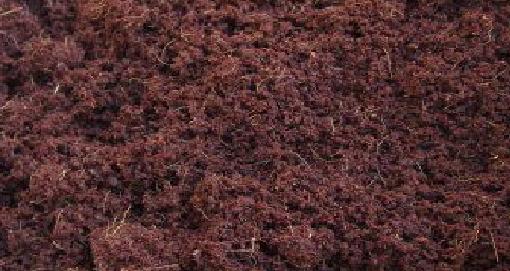COCONUT PEAT (CocoPeat) is getting extremely popular among the gardeners day by day. There are a lots of benefits to growing with coconut coir that you should know. Want to know what Coconut Coir is & how is it useful in gardening? We are trying to provide answers of all your concerns in detail below.
What is Coconut Peat?
Earlier coconuts were harvested for their delicious water and meat. The coconut husk was considered a waste product. Everything from the Coconut husk to it’s inner shell was thought to be a useless product…until it was found that it can be used in many ways in gardening and home products.

Coconut Peat
Coco Peat is the fiber like material present in between the solid internal shell and the outer coat of a coconut. There are two types of fibers — brown and white. Brown coir are collected from fully ripe coconuts and is quite stronger, but less flexible. White fibers are collected from pre-ripe coconuts and are very flexible, but less stronger. Mostly Brown Coir is used in gardening.
BENEFITS OF COCONUT PEAT
Retains moisture and provides a good environment – It is extremely effective for water retention. It can hold up to 10 times its weight in water, meaning the roots of your plants will never get dehydrated. This is extremely light which allows roots to expand freely thus promoting healthy root development.
It is completely Organic & Safe for Environment – It is derived from the natural resource and can be used again and again.
Insect-neutral – most garden pests do not like settling in coconut coir. Making it beneficial for the overall growth of your plants.
Can be used in-place of Traditional Hydroponics. – If you are someone who is new to hydroponic gardening then you should start with Coco Coir. As you will not have to buy or build a hydroponic system and do all of the maintenance that it requires.
DISADVANTAGE OF COCONUT COIR
No Nutrients – Coco Peat has no nutrients within it. It may look like soil, but it is not soil. This means you will need to add nutrients while using coconut coir.
Good for only Small Plants – Coco Peat is very light, so it is only good for small plants. Medium to big plants will not be able to stand still during a windy day and may get uprooted.
But at the same time, coconut Peat is very useful for starting seedlings which can be transplanted later.
In Conclusion
In conclusion, coco peat, also known as coconut coir, is a versatile and eco-friendly material with various uses. It can be used for gardening, seed starting, and as a substitute for traditional hydroponics. Coco peat retains moisture, promotes healthy root development, and is insect-neutral. However, it lacks nutrients and is more suitable for small plants. Despite its limitations, the benefits of coco peat include its organic nature, reusability, and lightweight properties. Whether you’re a gardener or a supplier, exploring the uses and advantages of coco peat can enhance your planting experience.
coco peat, coconut coir, cocopeat uses, how to use coco peat, coconut husk uses, what is cocopeat, what is cocopeat used for, how to make coco peat, coco peat disadvantages, coco peat benefits, coco peat for plants, coco coir suppliers, coconut coir bulk, lowes coco peat

2 thoughts on “What is CocoPeat & What are the Pros & Cons of it”